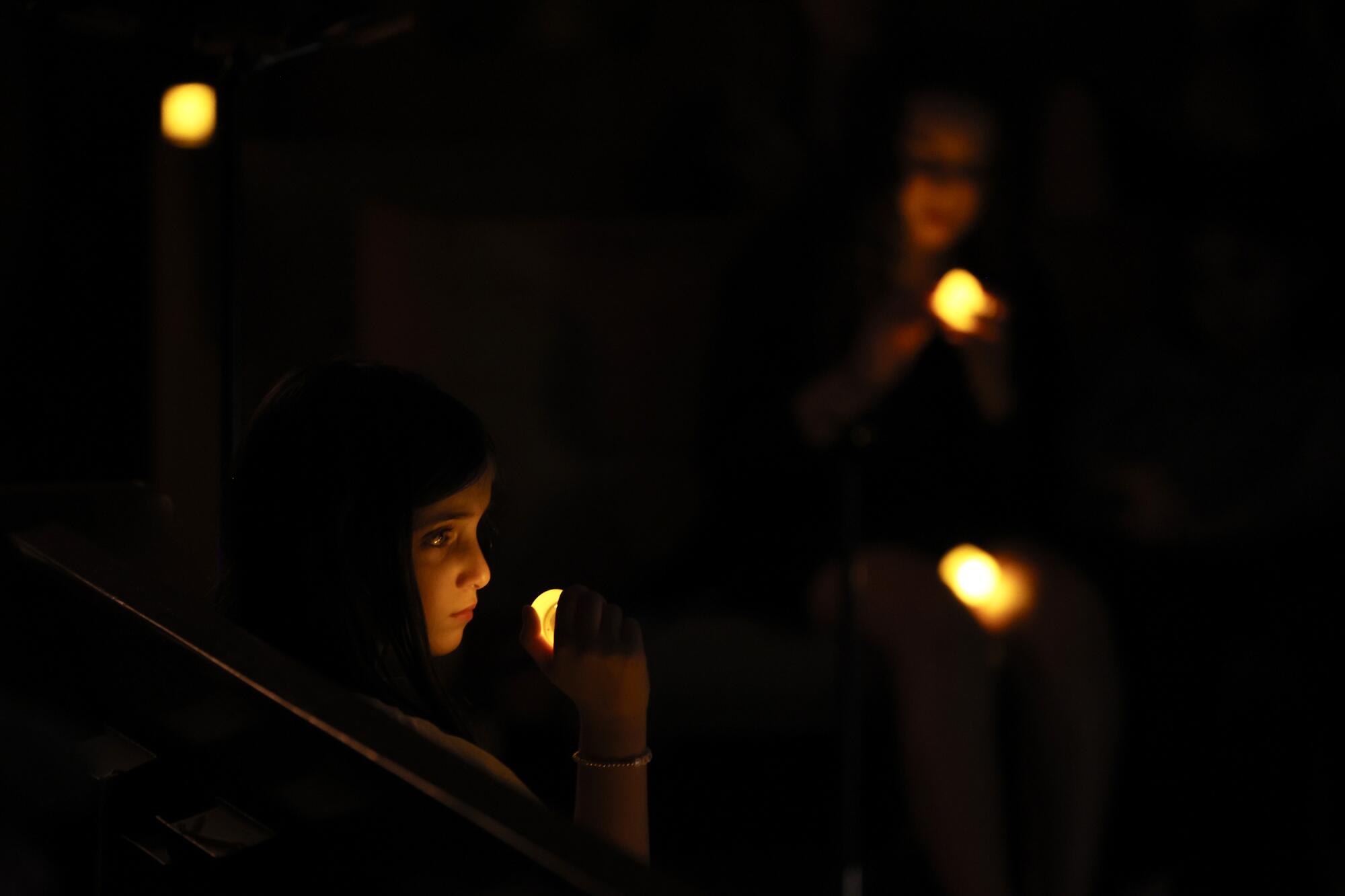
- Share via
Los Angeles is home to the second-largest Jewish community in America, with more than 500,000 members. And for the last few weeks, it’s been reeling.
Since the ambush by Hamas militants left more than 1,400 Israelis dead and saw the kidnapping of at least 200 others, Israel has sealed off the Gaza Strip from vital resources and launched a barrage of airstrikes.
Jewish Angelenos interviewed by the Times are largely supportive of Israel, which declared war on Hamas, the local authority in Gaza, following the deadly Oct. 7 attack. Many also disagree with the military assault on Gaza, and are heartbroken over the mounting Palestinian death toll, which has exceeded 7,000, including nearly 3,000 children, according to the Palestinian Health Ministry in Gaza. About 1.4 million Palestinians have been displaced, and Gaza’s healthcare system is teetering on the brink of collapse as water, fuel and vital medicines are running out, according to the World Health Organization.
The world is watching as Israel mounts an all-out invasion of Gaza.
The war is creating dual tragedies across the Israel-Gaza boundary. And in L.A.’s Jewish community — whose members hail from different backgrounds, ideologies, cultures and religious sects — people are coming together in unique ways.
Amid the anguish and anger, the confusion and conflicts, some have found a new kind of resolve and a newfound community.
Music as a healer
The crowd held its breath at Sinai Temple as Nilli Salem played an extended note on the shofar, an instrument typically made from a ram’s horn and used in important Jewish rituals.
“I really believe that artists are the healers of our time,” Chloe Pourmorady said outside the Westwood synagogue, where about 100 people gathered for a night of solidarity weeks after the initial attack on Israel.
Music is “something beyond words that connects people and brings comfort,” Pourmorady said.
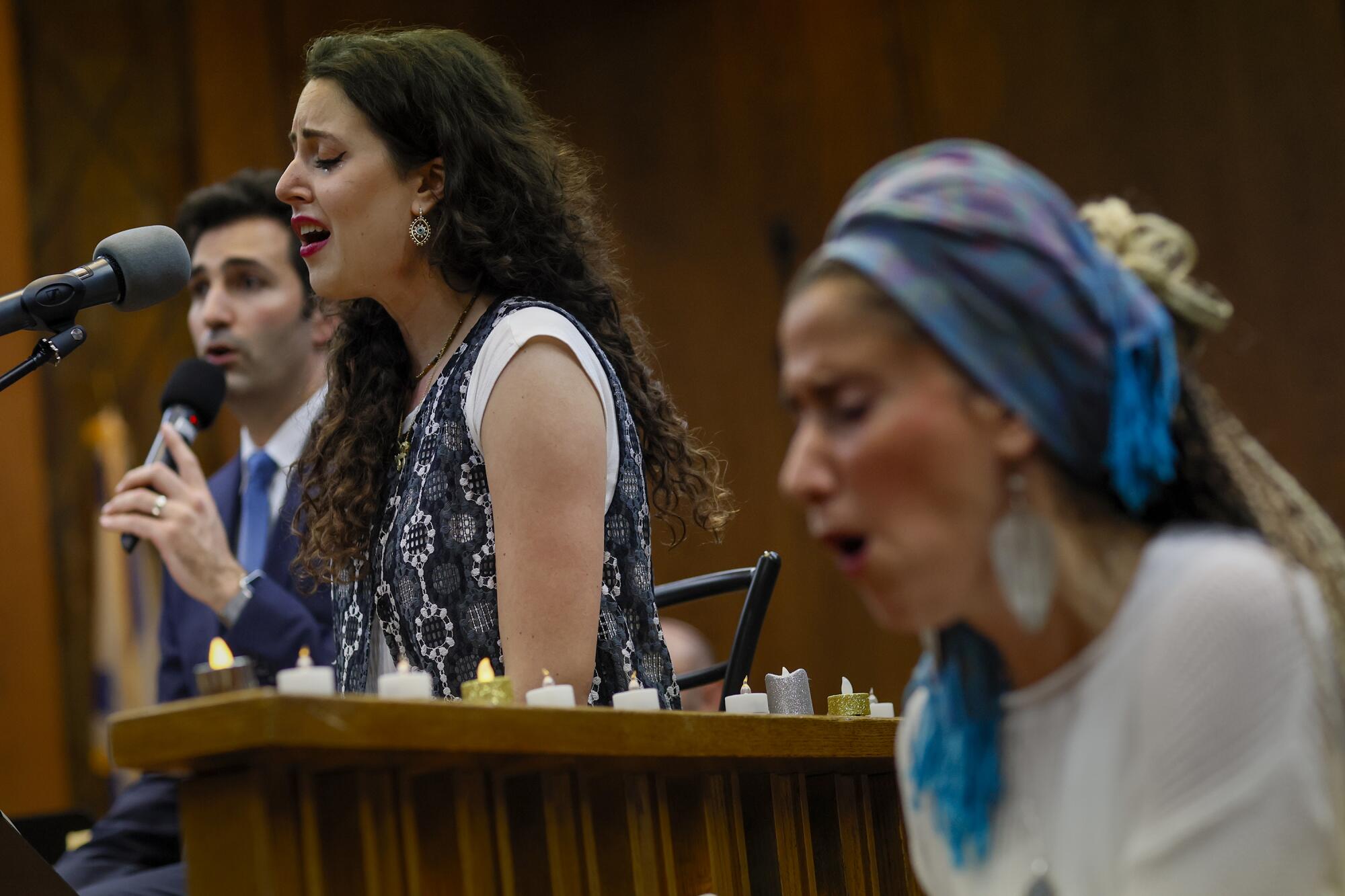
For many Jews in Los Angeles, there are few degrees of separation between the U.S. and Israel. The extent of death and warfare in the region, considered the Holy Land for Jews, Muslims and Christians alike, has been staggering — and has hit close to home.
Pourmorady had initially planned a musical gathering for friends, but felt compelled to invite the public so the community could dance, sing and cry together.
“Music is being used as a tool for comfort, healing and prayer during this time of great sadness and anguish,” said Cantor Marcus Feldman, who oversees the musical department at Sinai Temple and who sang at the event, which included performances in both Hebrew and English.
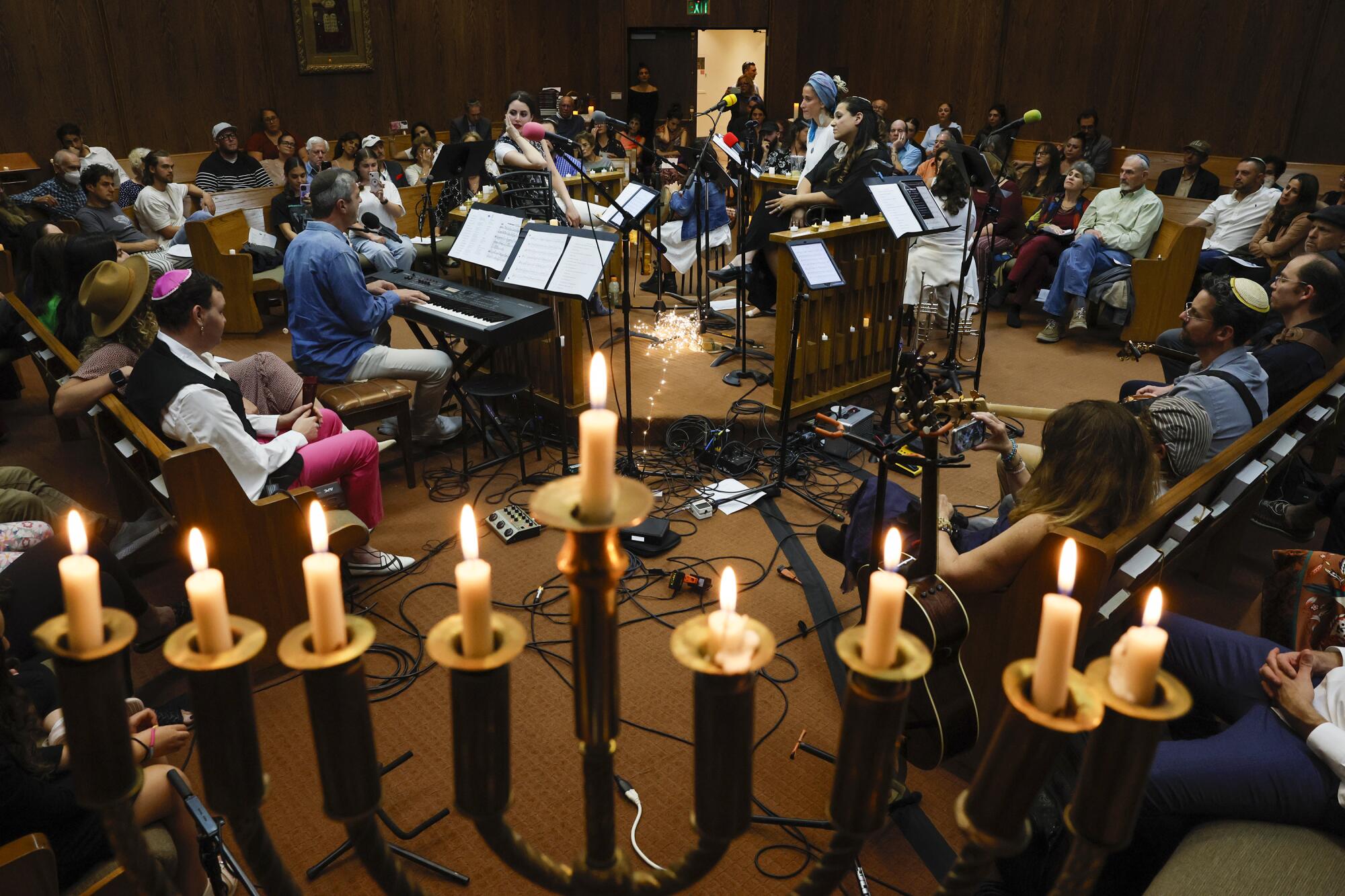
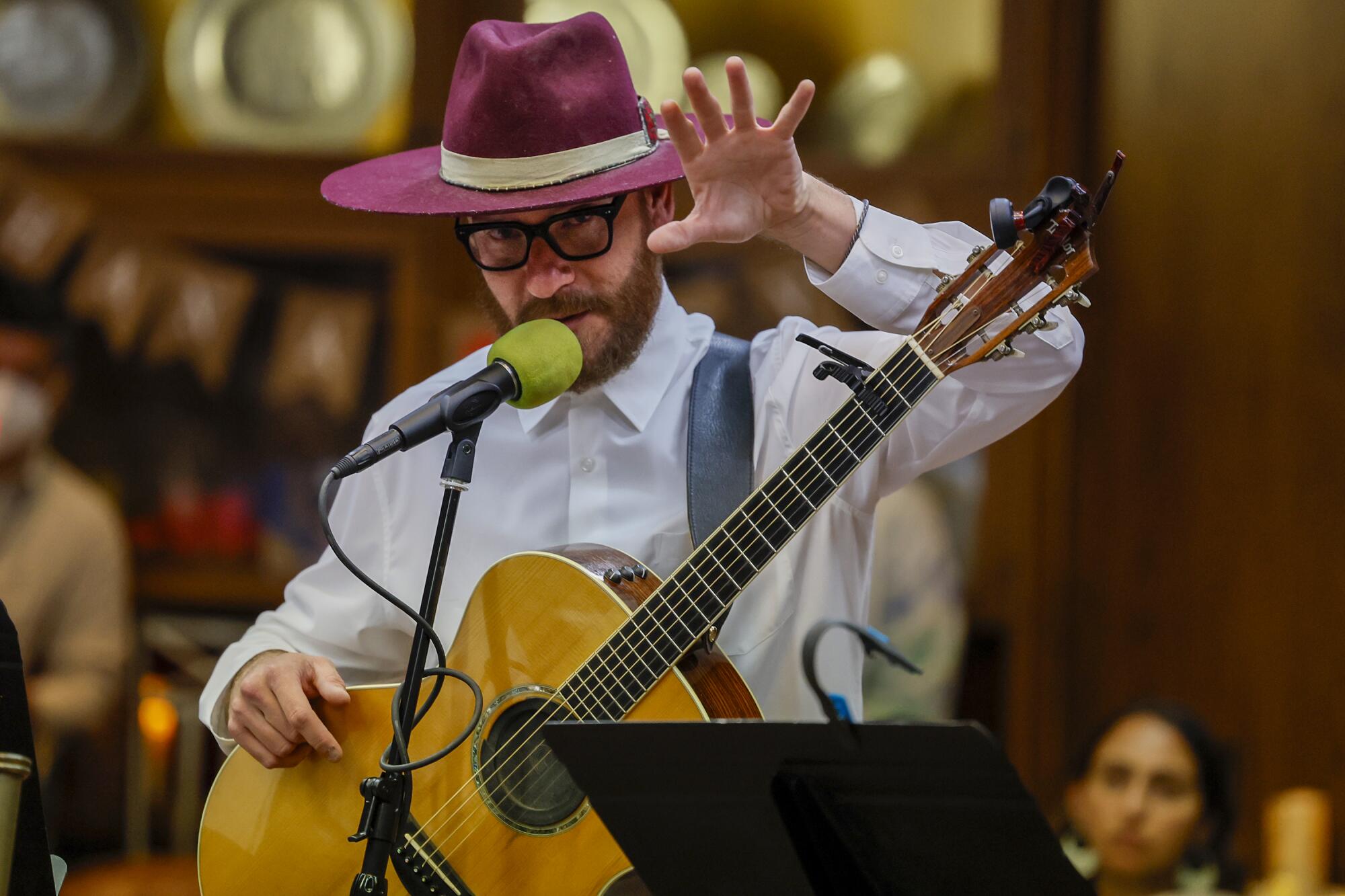
Emotions overtook many that night. Mikey Pauker’s voice broke before he started singing. He told the congregation that in the last few weeks, he’d been called a white supremacist for supporting Israel.
Azar Elihu, a former temple member, said the pain is universal, and she grieves for both sides.
“Even I feel for the Palestinians. I cried so much for the little boy that was killed in Chicago,” she said, referring to 6-year-old Wadea Al-Fayoume, a Muslim boy who was stabbed dozens of times in a deadly attack carried out by his family’s landlord.
But after the musical performance, Elihu said, “This felt like something of a healing.”
How do you talk to your children?
Nicole Guzik, a senior rabbi at Sinai Temple, said that in the weeks following the declaration of war, many in their Jewish community had drawn closer together, checking on one other. They ask: “Are you sleeping? Are you eating? Did you cry today?”
But they are also filled with outrage — and fear — as both antisemitic and anti-Muslim rhetoric abound online and in person.
While some in Israel have called for a full attack on Gaza, including a ground invasion, Sinai Temple congregants say they worry about innocent lives lost.
‘I also don’t want them to be afraid to go to school. I don’t want my daughter to be afraid to wear the Jewish star.’
— Amanda Kogan, of Sinai Temple’s board of directors
“I think what gets lost is that there isn’t a single Jew or Israeli who wants to see a single hair hurt on the head of any innocent civilian,” said Jason Cosgrove, who grew up in the synagogue and said he now finds himself explaining the war in Israel to his 7-year-old daughter and wondering when he will have to discuss antisemitism with her.
“I’m sparing her all of the gory details,” said Cosgrove, who finds himself taking breaks from the news when he can, but who also feels compelled to stay up to date on what’s happening. “I think you obviously can’t bury your head at a time like this.”
Amanda Kogan, who’s on the board of directors at Sinai Temple, also finds herself in the difficult position of trying to explain the war to her children. Her teenage daughter recently attended an event that involved a bus trip in Los Angeles, and the group was accompanied by an armed guard.
Kogan said she was doing her best to explain the complicated history between Israel and the Palestinians to her kids, noting that she doesn’t want to sanitize the details but that she also doesn’t want to alarm them.
“I also don’t want them to be afraid to go to school,” Kogan said. “I don’t want my daughter to be afraid to wear the Jewish star.”
“War is not fair to the innocent people. It’s terrible,” she added. “We’re trying to explain all of this as best we can in a very balanced manner. And no matter what, it’s all horrific.”
Sinai Temple boasts roughly 5,000 members and includes a private Jewish day school with about 600 students, a recreation center and a mental health center that offers counseling to the community.
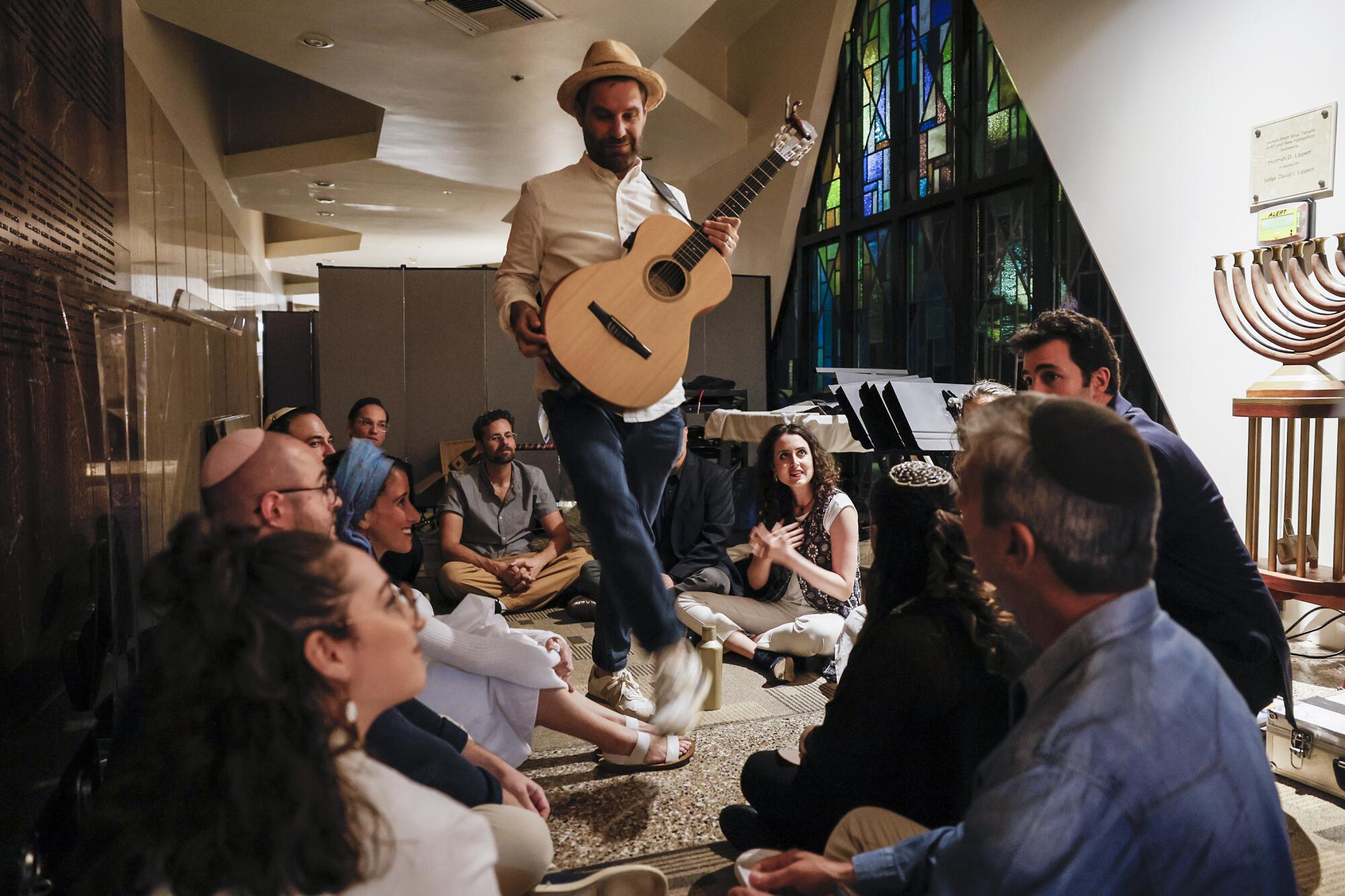
Members say their support for Israel is unwavering, and have gathered supplies, including headlamps, tents, blankets and phone chargers to be sent in care packages, which also include notes from children.
But grief hangs heavily over the community.
“As you walk through the halls here, it feels like a house of mourning,” said Senior Rabbi Erez Sherman.
Sherman and Guzik, husband and wife, became senior rabbis about two weeks after the attack on Israel as they worked to console their congregants.
Working for peace
Estee Chandler was a child living in Israel during the 1973 Yom Kippur War, fought between Israel and a coalition of Arab states led by Syria and Egypt. At the time, she worried every time her parents left their house at night. She would sometimes hear air raid sirens go off and hide with the rest of her family in the unfinished basement of their apartment building.
“Even back then, we had those places to go in. Now, Israelis have safe rooms in their homes,” the 50-year-old said. “[But] Palestinians who are being bombed — they have nothing. They don’t have those rooms to run into. They have no way to protect their children.”
When Chandler awoke to the news that Israel had declared war with Hamas, she started reaching out to friends and family living overseas. Then, she reached out to her colleagues at Jewish Voice for Peace, whose Los Angeles chapter she founded nearly 13 years ago.
“My heart sank thinking about what we were surely going to start seeing in the hours, days and weeks to come, and unfortunately, that has all borne out,” she said.
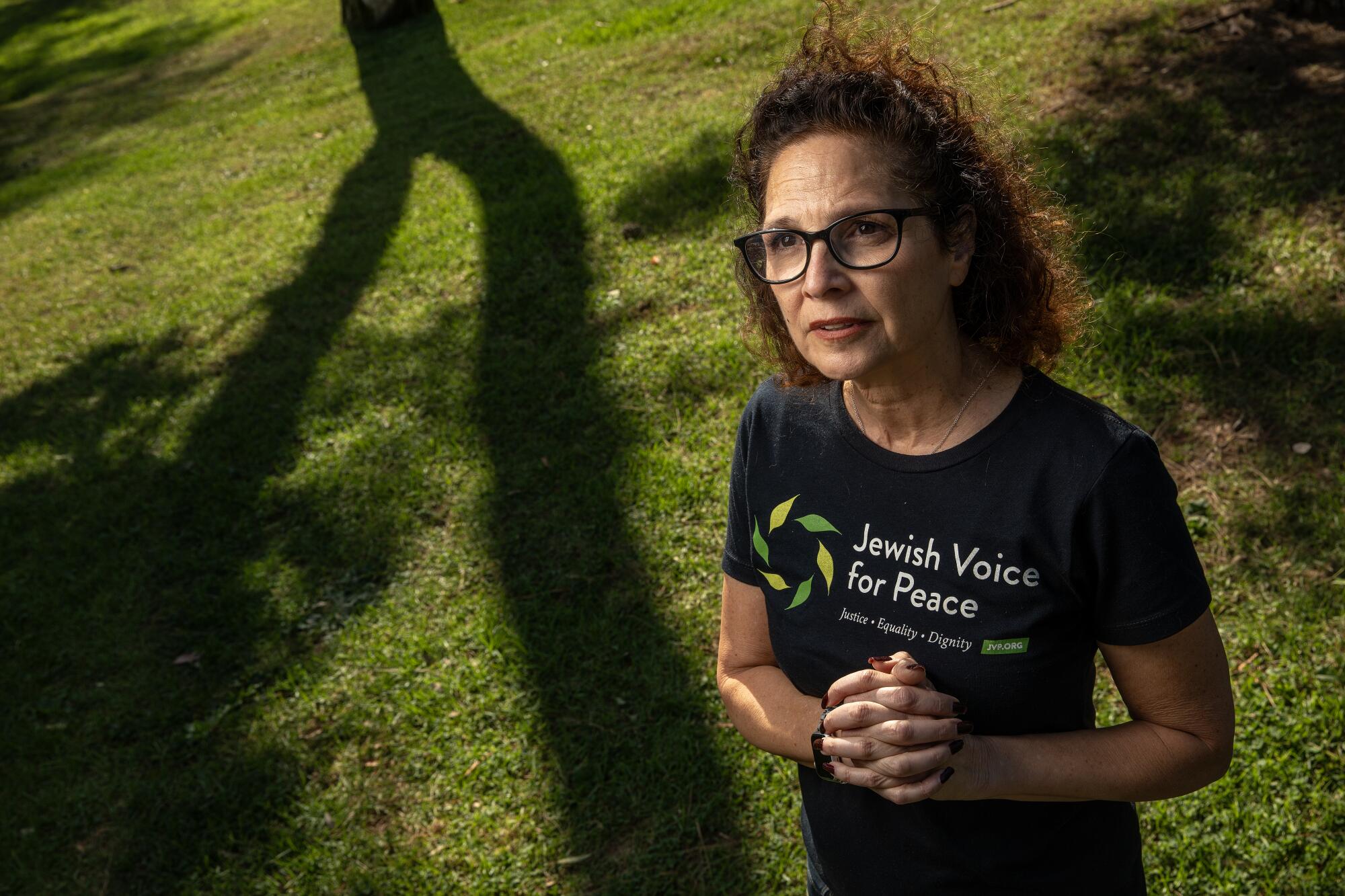
Jewish Voice for Peace and another Jewish organization, IfNotNow, have staged protests outside the White House and the homes of other politicians, demanding a cease-fire. Hundreds have been arrested while protesting at the U.S. Capitol in Washington.
While working for former President Obama’s 2008 campaign, Chandler said she saw “the intersection between the Israeli lobby and the Democratic Party politics.” She was upset by “a lot of horribly racist things” that were happening and tried to educate herself as much as possible about Israel.
Chandler later discovered Jewish Voice for Peace, which was supporting a movement at UC Berkeley to divest from weapons manufacturers providing arms to Israel. The group contacted Chandler and asked whether she would be interested in starting an L.A. chapter.
The daughter of an Israeli father, Chandler has relatives and friends in Israel and some fighting in the Israel Defense Forces, Israel’s national military. She also has friends whose family members were killed in Gaza by the Israeli airstrikes.
“My concern for my family’s safety and my friends’ safety doesn’t stop at any border,” she said. “It’s not a choice that has to be made. I don’t understand how people’s hearts can bleed in the same situation for only one-half of the people who are bleeding.”
One of Chandler’s friends is L.A. resident Hedab Tarifi, a Palestinian advocate and member of the Los Angeles Council of Religious Leaders. Tarifi has lost 69 family members in the bombings in Gaza.
‘I wake up in the middle of the night, and I can’t breathe. ... I have to swallow my pain and my anger, and remind myself that they don’t have a voice while they’re being bombed and massacred.’
— Hedab Tarifi, a Palestinian advocate and member of the Los Angeles Council of Religious Leaders
“I have a roller coaster of emotions,” said Tarifi, who was born in Gaza and moved to L.A. in the mid-1990s.
“I wake up in the middle of the night, and I can’t breathe. I want to cry, but I can’t cry. I’m mad, and at the same time, because I have to be their voice, I have to swallow my pain and my anger, and remind myself that they don’t have a voice while they’re being bombed and massacred,” she said. “I need to pull myself together and be their voice.”
Chandler and other Jewish Voice for Peace supporters want a cease-fire. They have been protesting in Los Angeles and recently attended a county supervisors meeting where a resolution condemning Hamas and supporting Israel was unanimously adopted after tense public comments.
She has been disheartened by media portrayals of the war as simply a battle between Israel and Hamas, noting that the events of Oct. 7 “didn’t come in a vacuum.”
“You can’t say that anything that happened there is unprovoked. You have people who have been living under siege for 75 years, people who’ve been living in a state of constant ethnic cleansing.”
While her support of Palestinian rights may seem unconventional in light of her heritage, Chandler said she wouldn’t be deterred — even if friends and family have opposing views.
“My family loves me anyway,” she said.
‘Never again’
When Mor Haim finally turned on the TV on Oct. 7 — breaking her usual observance of Shabbat — she watched as Hamas trucks bulldozed through a neighborhood in Sderot, an Israeli city near Gaza where she lived until the age of 7. She immediately recognized the street where her cousin lived.
‘I’m scared to talk on the phone in public, [worried that] someone will recognize my accent and say, “Hey, she’s Jewish.” ’
— Mor Haim
“Life was sucked out of me at that second,” said Haim, 31. Luckily, none of her family was killed, but the grief has been no less soul-crushing. The brother of her cousin’s wife went on a run the morning of the ambush, and was killed. Many childhood friends were slain. A friend’s father died shielding his children.
“Even though I’m far away, I feel as if I’m physically there,” said Haim, a dual Israeli American citizen who lives in Woodland Hills.
Since that night, Haim said, she’s had panic attacks and has been unable to sleep well.
She said she tries to go about her daily life for the sake of her four young children. She’s found solace baking challah with friends and family or just sitting in silence with others who share her pain.
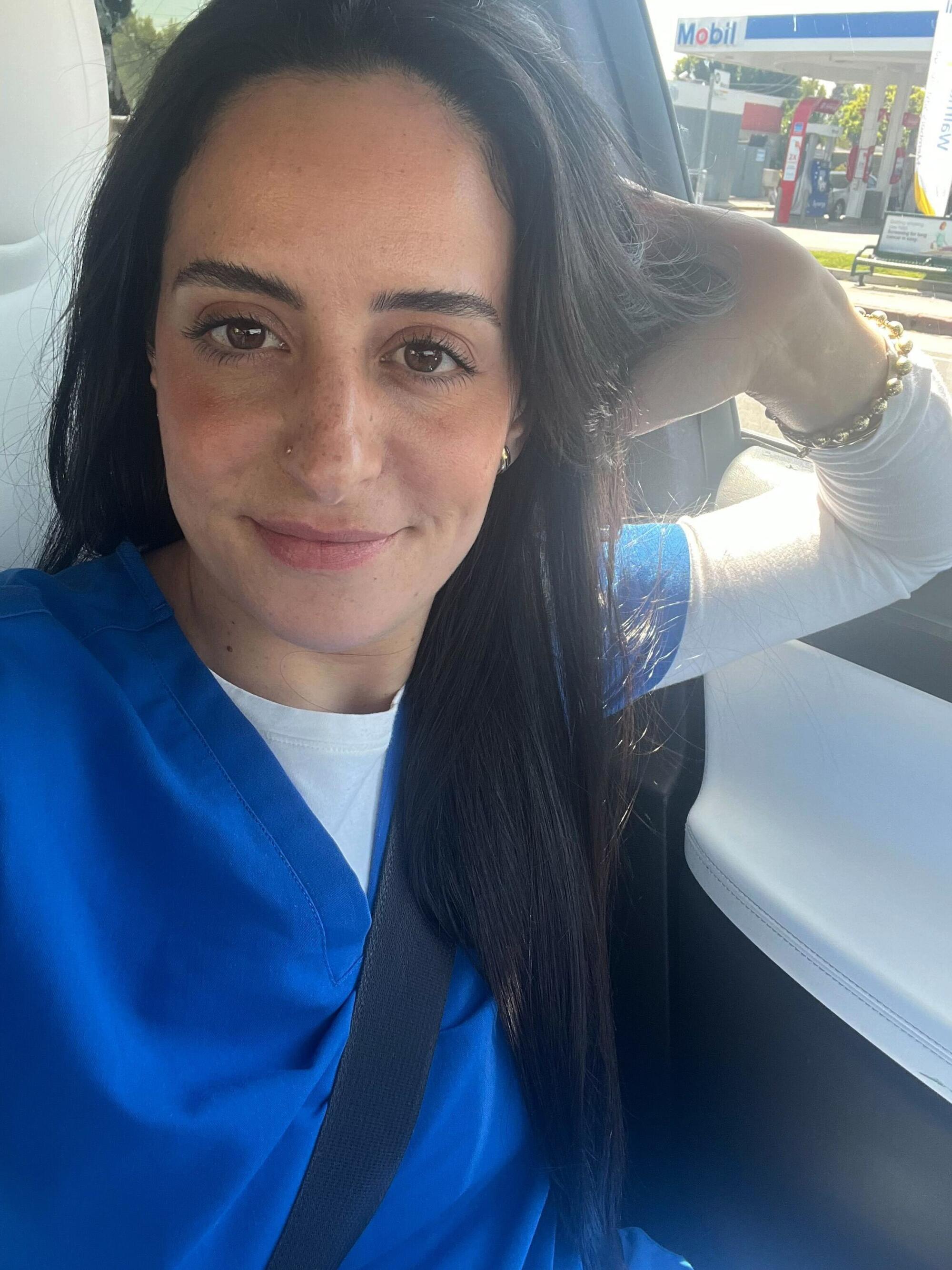
But the images from that day are seared in her mind, and she is afraid.
“I’m scared for my safety. I’m scared for my children’s safety,” she said. “I’m scared to talk on the phone in public, [worried that] someone will recognize my accent and say, ‘Hey, she’s Jewish.’”
“We’ve kind of been in hiding,” she said.
Haim wants people to understand why the attack on Israel — carried out on the holiday of Simchat Torah, a day meant for rejoicing — cannot be ignored.
She said no one wants innocent people to die — “not our people and not their people in Gaza.”
But Jewish people can’t stand idly by, and Israelis must fight to defend their country, their people, she said.
“We said ‘never again’ when we went through the Holocaust. And this is the never again,” she said. “It feels like we’re screaming our life out and nobody’s hearing us.”
More to Read
Sign up for Essential California
The most important California stories and recommendations in your inbox every morning.
You may occasionally receive promotional content from the Los Angeles Times.













